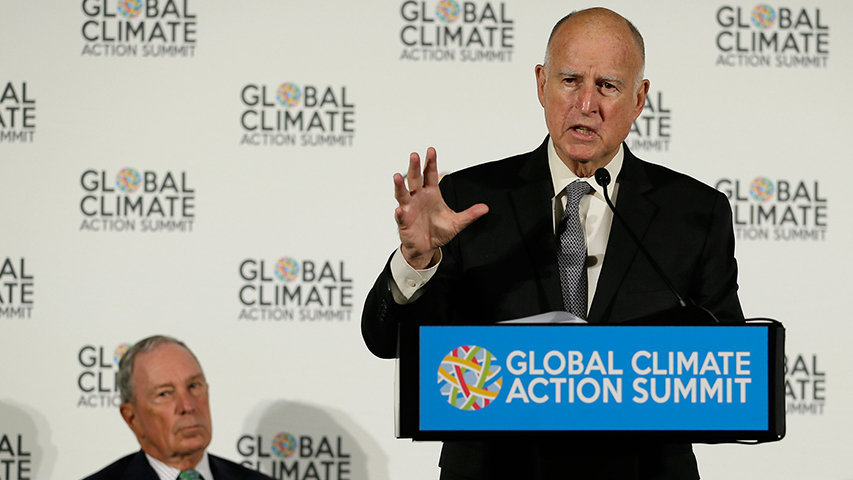
Global Climate Action Summit 2018: ‘The Challenge is to Act Sooner’
by Yash Saboo September 19 2018, 3:15 pm Estimated Reading Time: 3 mins, 58 secsCEO after CEO stood up to declare commitments to reducing carbon use, to everything they do now but cleaner and more efficiently in the Global Climate Action Summit held in San Francisco this week. “Getting to carbon-free” was the byword of the summit. And it would happen without affecting the profitability of the companies making those commitments.

The Nation
Climate change is one of the most pressing issues of our time and the mainstream media chose to stay relatively quiet about this hugely important global climate event, thanks to Apple’s new iPhones and other news. Harrison Ford and Jane Goodall’s appearances were the most publicised of all the brilliant news shared throughout the event which tells you a lot about the priorities of most media outlets – covering positive stories about corporate commitment to fighting climate change is clearly not one of them!
Winnie Byanyima, Executive Director of Oxfam International, spoke of climate justice in the open plenary session. “Climate change is a political issue, not a technical issue,” she said. “It’s a question of justice and fairness.”
“It would take my grandfather, who lives in Uganda, 129 years to emit the same carbon as the average American citizen,” she said. “The emissions that are damaging our planet are being produced by rich people, but the repercussions are hitting poor people the hardest.” And while poorer and less industrialized countries are making commitments to cleaner and renewable energy, that won’t make up for emissions coming from industrialized countries.
But as soon as she finished speaking, it was Kevin Johnson’s turn. He’s the CEO of Starbucks, and he’s clearly proud of his company’s environmental initiatives like using “greener cups”, for example. “We introduced a recyclable cup”, he said, but there were other issues–“not all cities have recycling facilities.” Nevertheless, he promised, “Our aspiration is to be the number one company in the world with a sustainable platform, from farmers to stores.”
“The pursuit of profit is not in conflict with doing good,” he declared. This seemed to be the real theme throughout the event.
Commitments were made, agreements were signed, speaker after speaker made big announcements about how soon they pledged to go carbon neutral or how much money they would invest in climate solutions; business leaders touted their energy efficiency achievements, declaring that it was definitely possible to “do good while doing well”–in other words, none of them were risking their bottom line. Civic leaders patted themselves on the back for committing to zero carbon by 2030, or 2045, or 2050, depending who was talking.
But youth leaders, indigenous leaders and leaders from countries outside of the industrialized nations kept reminding people that the investments were nowhere near enough; that the world’s attention was on the dangers of the planet, but concrete action is too slow in coming; that there isn’t a lot of time left to get something done.
“We can’t do any mitigation because we don’t own the industries that are causing these problems,” said Ambassador Macharia Kamau of Kenya. “We are victims of climate change—but we also need to figure out what we can do to fight it.”
City and state leaders in India are accelerating actions to combat climate change and protect its citizens from its impacts. This is welcome news since India is the world’s second most populated country (after China) and the third largest emitter of greenhouse gases (after China and the United States).
From installing cool roofs to protect the vulnerable from a warming climate to increasing solar power capacity, India is committing to climate action. One of their exciting announcements is the transition of their urban transportation systems to renewable energy. In one city, there are plans to roll out 500 electric buses by 2020, and that all diesel buses will be eliminated by 2021.
Among the landmark agreements, commitments, and pledges to reducing carbon emissions and fund climate efforts were these:
- Mayors of 27 cities worldwide signed an international agreement committing to reduce their carbon output and work to meet the Paris agreements on global average temperature rise.
- Mexico City became the first Latin American city to sign the “Green Bond” pledge to increase funding for climate-friendly infrastructure. (California, New Mexico, Rhode Island, Asheville, San Francisco, King County in Washington are among governmental entities that have already signed).
- The Global Green Bond Partnership was launched to support cities, states, regions, corporations, and financial institutions to accelerate the issuance of green bonds.




-173X130.jpg)
-173X130.jpg)
-173X130.jpg)

-173X130.jpg)
-173X130.jpg)

